
Simon Findlay Crean is an Australian politician and trade unionist. He was the Member of Parliament for Hotham from 1990 to 2013, representing the Labor Party, and served as a Cabinet Minister in the Hawke, Keating, Rudd and Gillard governments. He was the Leader of the Labor Party and Leader of the Opposition from November 2001 to December 2003.

Julia Eileen Gillard is an Australian former politician who served as the 27th prime minister of Australia from 2010 to 2013, holding office as leader of the Australian Labor Party (ALP). She previously served as the 13th deputy prime minister of Australia from 2007 to 2010, under Prime Minister Kevin Rudd. She is the first and only female to hold either office in Australian history.

Craig Anthony Emerson is an Australian economist and former Australian Labor Party politician. He served as the Australian House of Representatives Member for the Division of Rankin in Queensland from 1998 until 2013. Emerson also served as Minister for Trade and Competitiveness, Minister for Tertiary Education, Skills, Science and Research and Minister for Competition Policy, Small Business and Consumer Affairs in the Rudd and Gillard Governments.

Brendan Patrick O'Connor is an Australian politician who has served as Minister for Skills and Training since 2022. He is a member of the Australian Labor Party (ALP) and has served in the House of Representatives since 2001. He held ministerial office in the governments of Kevin Rudd and Julia Gillard from 2007 to 2013, including as a member of cabinet from 2012 to 2013. He was a member of the shadow cabinet from 2013 to 2022.

Stephen Francis Smith is the current High Commissioner of Australia to the United Kingdom and formerly an Australian politician who was a member of the House of Representatives for Perth from 1993 to 2013, representing the Australian Labor Party. He served as a minister in the Rudd and Gillard governments, including as Minister for Foreign Affairs (2007–2010), Minister for Trade (2010), and Minister for Defence (2010–2013).

Wayne Maxwell Swan, often colloquially referred to as Swanny, is an Australian politician serving as the 25th and current National President of the Labor Party since 2018, previously serving as the 14th Deputy Prime Minister of Australia and Deputy Leader of the Labor Party from 2010 to 2013, and the Treasurer of Australia from 2007 to 2013.
The Shadow Ministry of Tony Abbott was the opposition Coalition shadow ministry of Australia from December 2009 to September 2013, opposing the Australian Labor Party governments of Kevin Rudd and Julia Gillard.

Kim John Carr is an Australian former politician who served as a Senator for Victoria between 1993 and 2022. Representing the Labor Party, he was a minister in the Rudd and Gillard governments.
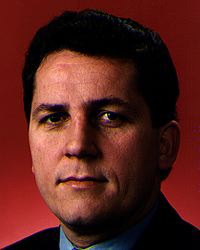
Christopher Vaughan Evans is an Australian former politician. He was a member of the Australian Senate for the state of Western Australia from 1993 to 2013, representing the Australian Labor Party.
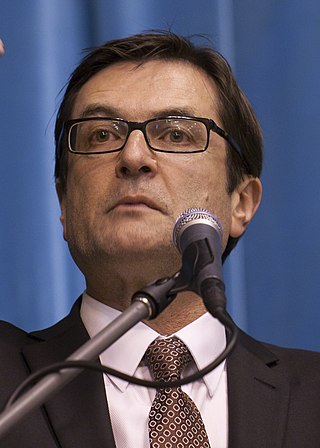
Gregory Ivan Combet is an Australian former politician and trade unionist. He was Secretary of the Australian Council of Trade Unions between 1999 and 2007. He was elected member for the New South Wales Federal seat of Charlton for the Australian Labor Party at the 2007 election and was immediately appointed Parliamentary Secretary for Defence Procurement in the First Rudd Ministry on 3 December 2007. Combet was the Minister for Climate Change, Industry and Innovation in the Second Gillard Ministry before announcing his resignation from the ministry on 26 June 2013 following Julia Gillard's defeat in a leadership ballot. He previously served as Parliamentary Secretary for Climate Change, when Penny Wong was the Minister.
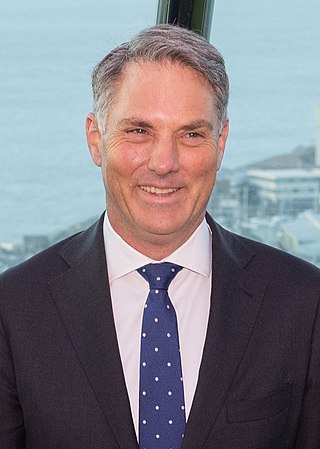
Richard Donald Marles is an Australian politician who has been deputy prime minister of Australia and Minister for Defence in the Albanese government since 2022. He has been deputy leader of the Australian Labor Party (ALP) since 2019.
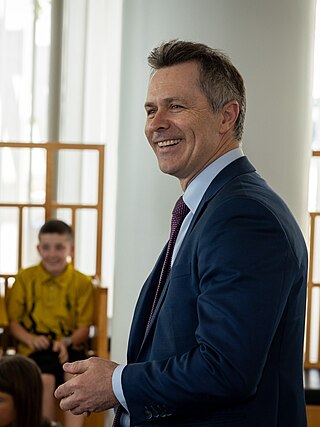
Jason Dean Clare is an Australian politician serving as Minister for Education since 1 June 2022. He is a member of the Australian Labor Party (ALP) and has represented the Division of Blaxland in Western Sydney since 2007.
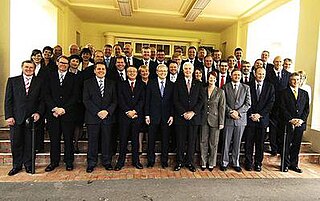
The first Rudd ministry (Labor) was the 64th ministry of the Government of Australia. It was led by the country's 26th Prime Minister, Kevin Rudd. The first Rudd ministry succeeded the Fourth Howard Ministry, which dissolved on 3 December 2007 following the federal election that took place on 24 November which saw Labor defeat John Howard's Liberal–National Coalition. The ministry was replaced by the First Gillard Ministry on 24 June 2010 following the resignation of Rudd as Prime Minister after a successful leadership challenge by Julia Gillard.

A leadership spill occurred in the Australian Labor Party on 24 June 2010. Kevin Rudd, the prime minister of Australia, was challenged by Julia Gillard, the deputy prime minister of Australia, for the leadership of the Australian Labor Party. Gillard won the election unopposed after Rudd declined to contest, choosing instead to resign. Gillard was duly sworn in as prime minister by Quentin Bryce, the Governor-General, on 24 June 2010 at Government House, becoming Australia's first female prime minister.

The Gillard government was the Government of Australia led by the 27th Prime Minister of Australia, Julia Gillard, of the Australian Labor Party. The Gillard government succeeded the first Rudd government by way of the Labor Party leadership spill, and began on 24 June 2010, with Gillard sworn in as Prime Minister by the Governor-General of Australia, Quentin Bryce. The Gillard government ended when Kevin Rudd won back the leadership of the Australian Labor Party on 26 June 2013 and commenced the second Rudd government.

The Second Gillard ministry (Labor) was the 66th ministry of the Australian Government, led by Prime Minister Julia Gillard. It succeeded the first Gillard ministry upon its swearing in by Governor-General Quentin Bryce on 14 September 2010 after the 2010 election.

A leadership spill in the Australian Labor Party, the party of government in the Parliament of Australia, was held on 27 February 2012 at 10 am AEDT, followed by a ballot. The Prime Minister, Julia Gillard, announced the spill at a press conference on 23 February 2012, following the resignation of the Minister for Foreign Affairs, Kevin Rudd, from his cabinet position after months of speculation that he intended to challenge Gillard for the leadership. Rudd announced his intention to seek the leadership at a press conference on 24 February.

A leadership spill in the Australian Labor Party, the party of government in the Parliament of Australia, was held on 21 March 2013. Prime Minister Julia Gillard called a ballot for the Leadership and Deputy Leadership of the Labor Party for 4.30pm, following a press conference by former Labor Leader and Regional Minister Simon Crean over persistent leadership tensions. At the caucus meeting, no alternative candidates nominated for the positions, and so Gillard and Wayne Swan were re-elected unopposed.
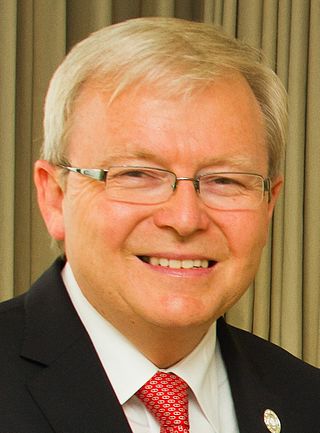
A leadership spill in the Australian Labor Party, the party then forming the Government of Australia, took place on 26 June 2013 at 7:00pm AEST. Prime Minister Julia Gillard called a ballot for Leader and Deputy Leader of the Labor Party live on Sky News Australia at 4:00pm, following persistent leadership tensions. She stated that she would retire from politics if she lost the vote, while calling on any would-be challengers to pledge to do the same if they lost. In a press conference held shortly after Gillard's announcement, backbencher and former Prime Minister Kevin Rudd announced that he would challenge Gillard, whilst also pledging to step down if he did not win the vote. At the ALP caucus meeting, Rudd was elected Leader of the Labor Party, with the caucus voting 57–45 in his favour.

The second Rudd government was the federal executive Government of Australia led by Prime Minister Kevin Rudd of the Australian Labor Party. It commenced on 27 June 2013 and ceased on 18 September 2013. Rudd had previously served a term as Prime Minister from 2007 to 2010 and been replaced by his deputy Julia Gillard, following an internal party spill. Rudd regained the Labor Party leadership by successfully re-challenging Gillard in a June 2013 party spill. On 5 August, Rudd called an election for 7 September 2013, which resulted in the defeat of his government by the Liberal/National Coalition led by Opposition Leader Tony Abbott.

















